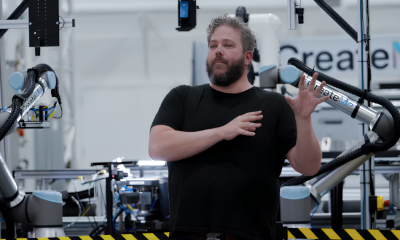Interviews
Ofer Ronen, Co-Founder and CEO of Tomato.ai – Interview Series

Ofer Ronen is the Co-Founder and CEO of Tomato.ai, a platform that offers an AI powered voice filter to soften accents for offshore agent voices as they speak, resulting in improved CSAT and sales metrics.
Ofer previously sold three tech startups, two to Google, and one to IAC. He spent the past five years at Google building contact center AI solutions within the Area 120 incubator. He closed over $500M in deals for these new solutions. He holds an MS in Computer Engineering with a focus on AI from the University of Michigan, and an MBA from Cornell.
What initially attracted you to machine learning and AI?
AI has had a long history of starts and stops. Periods when there was a lot of hope for the technology to transform industries, followed by periods of disillusionment because it didn’t quite live up to the hype.
When I was doing a Masters in AI a couple of decades ago, at the University of Michigan, it was a period of disillusionment, when AI was not quite making an impact. I was intrigued by the idea that computers could be taught to perform tasks through examples vs the traditional heuristics, which requires thinking about what explicit instructions to provide. At the time I was working at an AI research lab on virtual agents which help teachers find resources online for their classes. Back then we didn’t have the big data, the powerful compute resources, or the advanced neural networks that we have today, so the capabilities we built were limited.
From 2016 to 2019 you worked at Google’s Area 120 incubator to design highly robust virtual agents for the largest contact centers. What was this solution precisely?
More recently I worked at Google’s Area 120 incubator on some of the largest voice virtual agents deployments, including a couple of projects for Fortune 50 companies with over one hundred million support calls a year.
In order to build more robust voice virtual agents that can handle complex conversations, we took millions of historical conversations between humans and used those conversations to detect the type of follow-up questions customers have beyond their initial stated issue. By mining follow-up questions and by mining different ways customers phrase each question, we were able to build flexible virtual agents that can have meandering conversations. This mirrored better the kind of conversations customers have with human agents. The end result was a material increase in the total calls fully handled by the virtual agents.
In 2021 and 2022, you built a 2nd startup at Area 120,. could you share what this company was and what you learned from the experience?
My second startup within Area 120 was again focused on call centers. Our solution focused on reducing customer churn by proactively reaching out to customers right after a failed support call where the customer expressed their issue but did not get to a resolution. The outreach would be done by virtual agents trained to address those open issues. What I learned from that experience is that churn is a difficult metric to measure in a timely manner. It can take 6 months to get statistically significant results for changes in churn. That makes it hard to optimize an experience fast enough and to convince customers a solution is working.
Could you share the genesis story behind your third 3rd contact center AI startup Tomato.ai, and why you chose to do it yourself versus working within Google?
The idea for Tomato.ai, my third contact center startup, came from James Fan, my co-founder and CTO. James thought it would be more effective to sell wine using a French accent, and so what if anyone could be made to sound French?
This was the seed of the idea, and from there our thinking evolved. As we investigated it more we found a more acute pain point felt by customers when speaking with accented offshore agents. Customers had problems with comprehension and trust. This represented a larger market opportunity. Given our backgrounds, we realized the sizable impact it would have on call centers, helping them improve their sales and support metrics. We now refer to this type of solution as Accent Softening.
James and I previously led and sold startups, including each of us selling a startup to Google.
We decided to leave Google to start Tomato.ai because, after many years at Google, we were itching to get back to starting and leading our own company.
Tomato.ai solves an important pain point with call centers, which is softening accents for agents. Could you discuss why voice filters are a preferred solution to agent training?
At Tomato.ai, we understand the importance of clear communication in call centers, where accents can sometimes create barriers. Instead of relying solely on traditional agent training, we’ve developed voice filters, or what we call “accent softening.” These filters help agents maintain their unique voice, while reducing their accents, improving clarity for callers. By using voice filters, we ensure better communication and build trust between agents and callers, making every interaction more effective and satisfying to the customer. So, compared to extensive training programs, voice filters offer a simpler and more immediate solution to address accent-related challenges in call centers.
As existing agents leverage these tools to enhance their performance, they will be empowered to command higher rates, reflecting their increased value in delivering exceptional customer experiences. Simultaneously, the democratizing effect of generative AI will bring new entry-level agents into the fold, expanding the talent pool and driving down hourly rates. This dichotomy signifies a fundamental transformation in the dynamics of call center services, where technology and human expertise reshape the landscape of the industry, paving the way for a more inclusive and competitive future.
What are some of the different machine learning and AI technologies that are used to enable voice filtering?
This type of real-time voice filtering solution would not have been possible just a couple of years ago. Advancements in speech research combined with newer architectures like the transformer model and Deep Neural Networks, and more powerful AI hardware (like TPUs from Google, and GPUs from NVidia) make it more possible to build such solutions today. It is still a very difficult problem that requires our team to invent new techniques for training speech-to-speech models that are low latency, and high quality.
What type of feedback has been received from call centers, and how has it impacted employee churn rates?
We have strong demand from large and small offshore call centers to try out our accent softening solution. Those call centers recognize that Tomato.ai can help with their top two problems (1) offshore agents’ performance metrics are not up to par vs onshore agents (2) it is difficult to find enough qualified agents to hire in offshore markets like India and The Philippines.
We expect in the coming weeks to have case studies that highlight the type of impact call centers experience using Accent Softening. We expect sales calls to see an immediate lift in key metrics like revenue, close rates, and lead qualification rates. At the same time, we expect support calls to see shorter handle times, fewer callbacks, and improved CSAT.
As mentioned above churn rates take longer to validate, and so case studies with those improvements will come at a later date.
Tomato.ai recently raised a $10 million funding round, what does this mean for the future of the company?
As Tomato.ai gears up for its inaugural product launch, the team remains steadfast in its commitment to reshaping the landscape of global communication and the future of work, one conversation at a time.
Thank you for the great interview, readers who wish to learn more should visit Tomato.ai.












